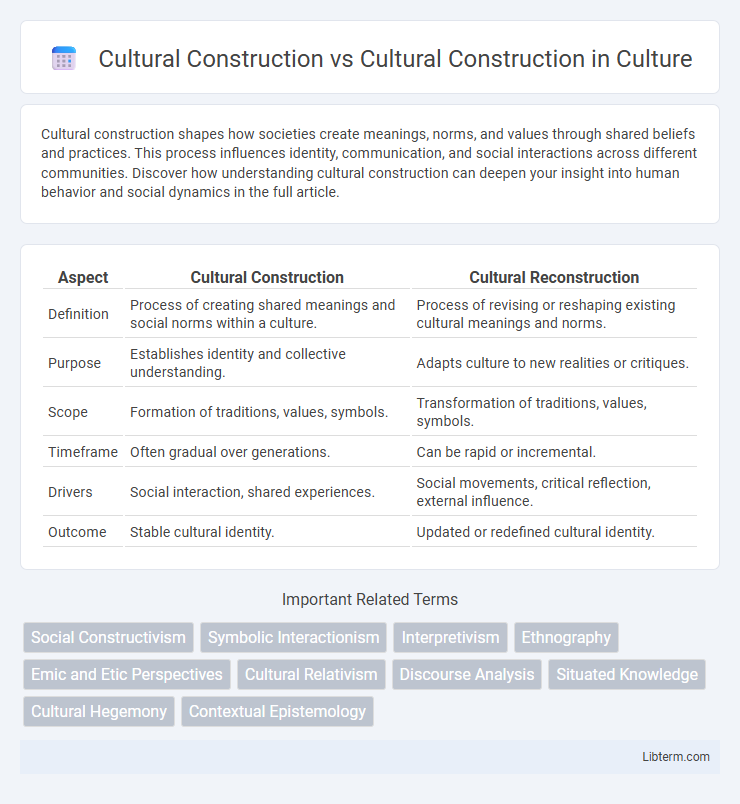Cultural construction shapes how societies create meanings, norms, and values through shared beliefs and practices. This process influences identity, communication, and social interactions across different communities. Discover how understanding cultural construction can deepen your insight into human behavior and social dynamics in the full article.
Table of Comparison
| Aspect | Cultural Construction | Cultural Reconstruction |
|---|---|---|
| Definition | Process of creating shared meanings and social norms within a culture. | Process of revising or reshaping existing cultural meanings and norms. |
| Purpose | Establishes identity and collective understanding. | Adapts culture to new realities or critiques. |
| Scope | Formation of traditions, values, symbols. | Transformation of traditions, values, symbols. |
| Timeframe | Often gradual over generations. | Can be rapid or incremental. |
| Drivers | Social interaction, shared experiences. | Social movements, critical reflection, external influence. |
| Outcome | Stable cultural identity. | Updated or redefined cultural identity. |
Understanding Cultural Construction: Definition and Scope
Cultural construction refers to the process by which societies create shared meanings, symbols, and practices that shape collective identity and social realities. It encompasses language, rituals, values, and norms that are continuously negotiated and reinforced within a community. Understanding cultural construction involves analyzing how these elements influence perceptions, behaviors, and power dynamics in various social contexts.
Theoretical Foundations of Cultural Construction
Theoretical foundations of cultural construction emphasize the dynamic process through which societies create and organize collective meanings, values, and identities, shaping social realities rather than merely reflecting them. Cultural construction theory integrates concepts from social constructivism and symbolic interactionism, highlighting how cultural norms and knowledge emerge from social interactions and historical contexts. Key theorists like Berger and Luckmann argue that culture is maintained through institutionalization and habitualization, illustrating the ongoing negotiation between individual agency and structural forces in constructing cultural meanings.
Cultural Construction in Anthropology vs Sociology
Cultural construction in anthropology examines how human behaviors, beliefs, and practices are shaped by shared cultural meanings and symbols within specific societies, emphasizing ethnographic context and the role of rituals and traditions. In sociology, cultural construction focuses on how social structures, power relations, and institutional interactions create and maintain cultural norms, highlighting processes like socialization, identity formation, and collective behavior. Both disciplines analyze culture as a dynamic construct, yet anthropology prioritizes cultural relativism, while sociology emphasizes the impact of social organization and inequality on cultural meanings.
Key Differences in Cultural Construction Approaches
Cultural construction involves how societies collectively create meanings, traditions, and social norms through shared practices and symbols. Structuralist approaches emphasize the role of underlying systems and binary oppositions in shaping cultural meanings, while postmodern perspectives highlight the fluid, fragmented, and contested nature of cultural narratives. Key differences lie in the interpretation of culture as either a stable, rule-governed system or an ongoing process influenced by power dynamics and individual agency.
Social Influences on Cultural Construction
Social influences play a critical role in the cultural construction process by shaping shared beliefs, values, and norms within a community. Institutions such as family, education, media, and religion act as primary agents that transmit and reinforce cultural meanings, contributing to collective identity and social behavior patterns. These dynamic interactions highlight how cultural construction is not static but continuously evolves in response to societal changes and power relations.
Examples of Cultural Construction in Practice
Cultural construction manifests through social norms, language, and traditions shaping individual and collective identity. For example, gender roles vary significantly across societies, reflecting culturally constructed expectations rather than biological determinants. Rituals such as marriage ceremonies and rites of passage further illustrate how cultural meanings are actively created and maintained within communities.
Debates: Constructivist vs Essentialist Perspectives
Debates between constructivist and essentialist perspectives in cultural construction center on whether culture is fluid and socially constructed or fixed and inherent. Constructivists argue that cultural identities are dynamic, shaped by social interactions and historical contexts, emphasizing the role of power and discourse in forming cultural meanings. Essentialists maintain that certain cultural traits are innate and immutable, rooted in biological or historical continuities, thereby resisting changes imposed by external social forces.
Impact of Globalization on Cultural Construction
Globalization significantly accelerates the dynamic process of cultural construction by facilitating the exchange and hybridization of cultural elements across borders. This worldwide interconnectedness reshapes identities and social practices, blending traditional values with global influences. Consequently, cultural construction evolves into a complex interplay between preserving local uniqueness and embracing global trends.
Challenges in Analyzing Cultural Construction
Analyzing cultural construction presents challenges such as the fluidity of cultural meanings, which vary across contexts and over time, complicating consistent interpretation. Researchers must navigate subjective perspectives and biases embedded within societal narratives, affecting the accuracy of cultural analysis. Limited access to diverse cultural viewpoints restricts comprehensive understanding and may result in oversimplified representations.
Future Trends in Cultural Construction Studies
Future trends in cultural construction studies emphasize the integration of digital technologies and augmented reality to preserve and reconstruct heritage sites with higher accuracy and interactive experiences. Interdisciplinary approaches combining anthropology, urban design, and data science enable more dynamic analyses of how cultures evolve in response to globalization and climate change. The growing focus on sustainable cultural construction prioritizes eco-friendly materials and community involvement to maintain cultural identity while addressing environmental challenges.
Cultural Construction Infographic

 libterm.com
libterm.com